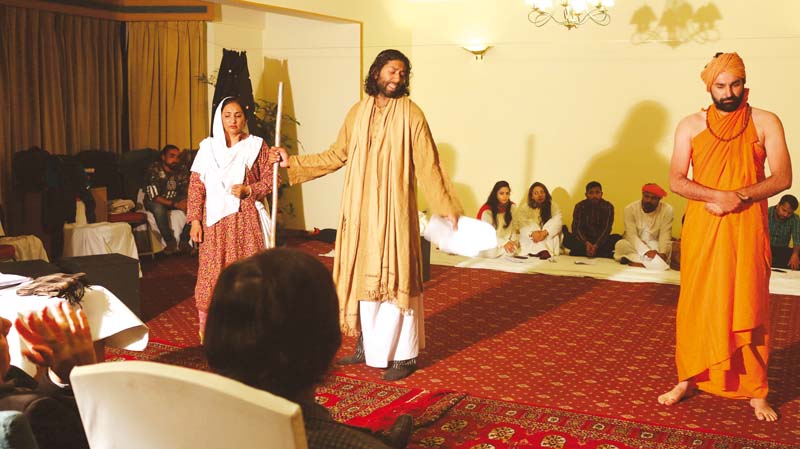
The role of initiatives such as Ajoka Theatre has been seminal in keeping the fire burning for dramatics in Pakistan.
The theatre troupe’s activities are in full swing as it plans to start the New Year with a new production revolving around the life of mystic Bhagat Kabir. The play will open doors to audiences in the last week of January at Alhamra Arts Council, Lahore.
Casting for the production is nearing completion and the troupe administration plans on staging the play in various cities across the country. Ajoka Theatre’s boss Madiha Gohar who is recovering from illness, will be directly involved in the scripting.
Bridging gaps with theatre
According to Qasim Ali, the spokesperson for Ajoka, the team is currently conducting a five-day workshop casting and training selected artists as per the requirements of the play. The actors have shown great enthusiasm about the play and the workshops will continue for the weeks to come. “The play highlights the life, poetry and philosophy of Bhagat Kabir and encapsulates the message of the Sufi. Rehearsals will soon be over,” added Ali.
Shahid Nadeem, Madiha’s husband and executive director at Ajoka, is overseeing the process and has also engineered the play’s script. “There is a strong need to spread Bhagat Kabir’s message in a society like ours, since his approach towards the Bhakti movement is very close to that of other Sufi saints of the Indian subcontinent, such as Baba Bulleh Shah,” said Nadeem. He added that the purpose of the play is to remove anxiety, aggression and hate from society. “Our new generation, the youth of Pakistan, knows little about the Bhakti movement and so this play will be a way to educate them on the subject.”
Symbol of hope: Faiz’s message of peace should be spread further, says Rajwana
Shedding light on its storyline, Nadeem said the play orbits the childhood of Kabir, his upbringing in a family of Muslim weavers, his relationship with his mother and his married life. “The play also looks at certain elements that considered him a threat to society and to the Lodhi dynasty.” The story builds upon Kabir’s confrontation with rulers, who soon realised his intentions and barred religious groups from pointing fingers at him in the future. “The king fought for Kabir against the Muslim and Hindu clerics who blamed him for dominating their territories,” he added.
It was Kabir’s remarkable personality that made both Hindus and Muslims revere him. While there are countless myths about his religious inclinations, birth and youth, there is no gainsaying that he didn’t leave a mark on the people of his time and future generations. Some historians believe he was Muslim, whereas others claime he was Hindu, but what everyone agree on is the fact that his poetry and preaching shaped up the concepts of co-existence and asceticism in the region.
Published in The Express Tribune, January 14th, 2016.
Like Life & Style on Facebook, follow @ETLifeandStyle on Twitter for the latest in fashion, gossip and entertainment.

1721377568-0/BeFunky-collage-(18)1721377568-0-165x106.webp)



1732607724-0/Express-Tribune-(4)1732607724-0-270x192.webp)
1732600740-1/Untitled-design-(1)1732600740-1-270x192.webp)










COMMENTS
Comments are moderated and generally will be posted if they are on-topic and not abusive.
For more information, please see our Comments FAQ